Rapporti ISTISAN 09/49 ISTITUTO SUPERIORE DI SANITÀ Ageing ...
Rapporti ISTISAN 09/49 ISTITUTO SUPERIORE DI SANITÀ Ageing ...
Rapporti ISTISAN 09/49 ISTITUTO SUPERIORE DI SANITÀ Ageing ...
Create successful ePaper yourself
Turn your PDF publications into a flip-book with our unique Google optimized e-Paper software.
<strong>Rapporti</strong> <strong>ISTISAN</strong> <strong>09</strong>/<strong>49</strong><br />
prevention, as regards services too, of the institutions and the policies focused on the protection of<br />
health in a wide sense. Professionals working in the field of help, within an ecological-systemic<br />
perspective, become “facilitators” of the psycho-physical wellbeing of the elderly and, at the same<br />
time, “mediators” of the culture of wellbeing within the different contexts of social interaction:<br />
with the task of making resources emerge and exploiting them, of fostering propulsive dynamics<br />
and promoting the point of view of wellbeing and psychological autonomy. In this perspective the<br />
condition of wellbeing in general can be improved through a fundamental work networking and<br />
involvement of the different formal and informal resources present on the territory envisaging the<br />
active involvement of the elderly and operators. Thanks to their activities, even and above all the<br />
free and spontaneous ones, it is possible to let concrete needs emerge, to offer a wider range of<br />
responses, to understand the meaning of discrimination or discomfort from more points of view, to<br />
offer a human and relational approach suitable for giving dignity back to people and to offer<br />
further complementary responses to be added to those already given by professional services. The<br />
envisaged intervention is then based on a model of educational and cultural model focused on the<br />
person: on personal and relational resources. A model which considers the elderly active and<br />
protagonists in a society which can still consider them as a resource for the different generations to<br />
which they relate themselves: a model focused on the involvement of social and health operators<br />
together with the elderly in the construction of a new life culture and a healthy ageing. The<br />
success of the individual within the community and his/her wellbeing is the priority goal in each<br />
degree and level of the world of adult’s education and training, both formal one (from the school<br />
to professional training up to university) and informal or non-formal one (from study circles to<br />
schools and popular universities). The culture of the competent development during the whole<br />
lifespan helps people to manage the changes of their life cycle, more efficiently and peacefully.<br />
One of the most difficult questions in the training of operators working with the elderly regards<br />
the link between professionalism and social competencies and professionalism and medical-health<br />
competencies. From one side the training of health roles seems to be strongly characterised by the<br />
specific medical-geriatric dimension, on the other side that of social operators is less focused on<br />
the “health” side of the question. In some cases the presence of psychologists or sociologists is<br />
envisaged, but such presence results to be strongly marginal if compared with the whole approach.<br />
If today the social-psychological and the medical-health fields result to be so poorly<br />
interconnected that even training approaches result to be quite apart from each other, such<br />
separation seems even more to be less acceptable. From one side there is the consciousness of the<br />
connection existing between health and social-family conditions in causing the occurrence of<br />
situations of need and/or specific demands of support regarding services, on the other side their<br />
responses to needs must take into account the whole of the existing resources (health, social,<br />
public and private resources). It then becomes more and more important to identify areas of<br />
overlapping of the approach procedures to the elderly’s conditions and then to specific knowledge.<br />
An example of training addressed to social-health operators according to a holistic intervention<br />
perspective on the elderly is presented with the VATO training package (see<br />
http://www.kam.fi/vato/index.html). Such training is above all focused on the functional abilities<br />
of the elderly, resorting to a gerontological approach based on the functional vision of health.<br />
According to such gerontological approach, the functional ability, the performance and health are<br />
resources to be absolutely identified, enhanced, supported and promoted in terms of development.<br />
To evaluate functional ability and to face daily life results it is more important than focusing the<br />
attention on disturbances, diseases and the limits typical of the elderly. One of the main goals of<br />
operators is that of facilitating autonomy among the elderly, as regards the daily management of<br />
their life: the elderly must be able to take care of themselves, to cope with daily problems and to<br />
represent a resource for their society. The support of the elderly’s functional ability should derive<br />
from his ideals and concrete needs and the main function of operators should be that of<br />
40



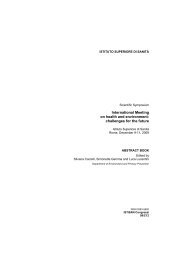
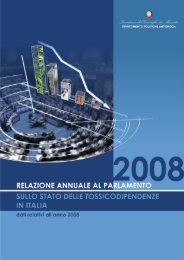
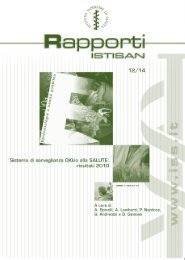
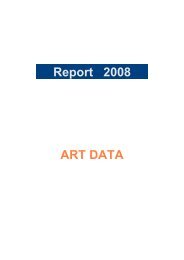
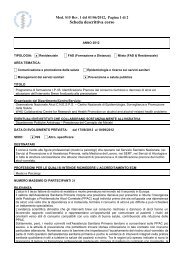
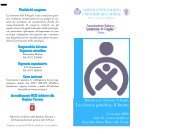
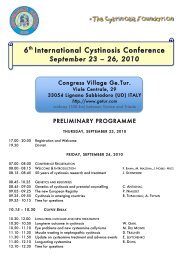
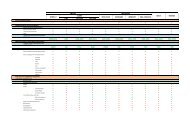
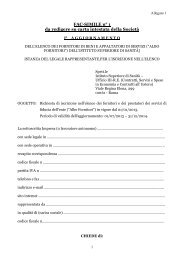
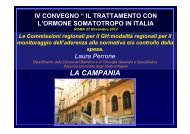
![Emilia Romagna [PDF - 175.10 kbytes]](https://img.yumpu.com/23556597/1/184x260/emilia-romagna-pdf-17510-kbytes.jpg?quality=85)
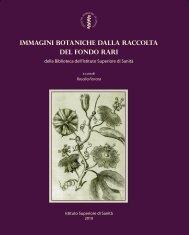
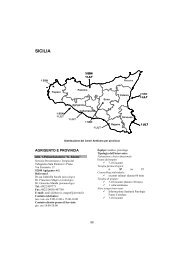
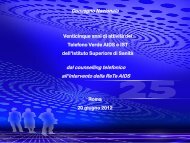
![Istisan Congressi N. 66 (Pag. 1 - 81). [PDF - 2021.12 kbytes] - Istituto ...](https://img.yumpu.com/23556493/1/171x260/istisan-congressi-n-66-pag-1-81-pdf-202112-kbytes-istituto-.jpg?quality=85)